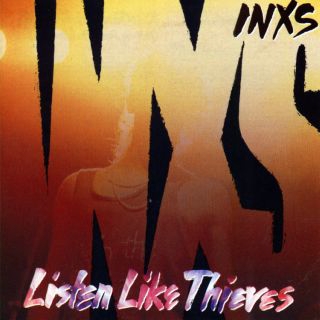
Listen Like Thieves is the fifth studio album by Australian rock band INXS. It was released on 14 October 1985. It spent two weeks at number one on the Australian Kent Music Report Albums Chart. Considered an international breakthrough album for the band, it peaked at No. 11 on the United States Billboard 200, No. 24 on the Canadian RPM 100 Albums and top 50 in the United Kingdom.
William Shakespeare was the stage name of Australian glam rock singer, born as John Stanley Cave, also known as John Cabe or Billy Shake. He had two Australian hit singles, "Can't Stop Myself from Loving You", which peaked at No. 2 on the Kent Music Report in 1974, and "My Little Angel", which peaked at No. 1 in 1975. Both hits were written by Vanda & Young, who also turned Shakespeare into a glam rocker. After decades of alcohol addiction and clinical depression he became destitute; he was assisted by music industry benevolent society, Support Act, from 2001. He died suddenly in October 2010, aged 61.

"Love at First Feel" is a song by Australian hard rock band AC/DC. It is the second track of the international version of their album Dirty Deeds Done Dirt Cheap, released in November 1976, and was written by Angus Young, Malcolm Young, and Bon Scott. The international version was not released in the United States until April 1981.

"You're in My Heart " is a song written and recorded by Rod Stewart for his 1977 album Foot Loose & Fancy Free. The song become a hit, reaching the top ten of many countries, including the United States, Canada, and Australia, peaking at number 1 for one week.
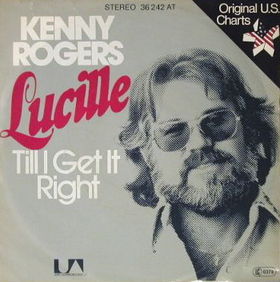
"Lucille" is a song written by Roger Bowling and Hal Bynum, and recorded by American country music artist Kenny Rogers. It was released in January 1977 as the second and final single from the album Kenny Rogers. It became Rogers' first major hit as a solo artist after leaving the successful country/rock group The First Edition the previous year. An international hit, it reached number 1 on the Billboard Country Singles chart and number 5 on the Billboard Hot 100. Overseas, "Lucille" reached the top of the UK Singles Chart in June 1977, the first of Rogers' two number 1 singles there.

"Undercover Angel" is a song by singer-songwriter Alan O'Day. Released as a single in 1977, it was certified gold, having reached No. 1 on the Billboard Hot 100 and No. 9 on the Australian Singles Chart.

"Montego Bay" is a song co-written and performed by Bobby Bloom about the city in Jamaica of the same name. The song was a top 10 hit for Bloom in the Fall of 1970 on both sides of the Atlantic. It reached No. 3 on the UK Singles Chart, No. 5 on the Canadian RPM 100 Singles Chart, No. 7 on the Australian Go-Set Singles Chart and No. 8 on the US Billboard Hot 100. The song was co-written and produced by Jeff Barry. In the master tape of the song, Bloom breaks into a chorus of "Oh, What a Beautiful Mornin'" at the end of the recording. The song features a whistler, as well as Jamaican instruments in a calypso style.
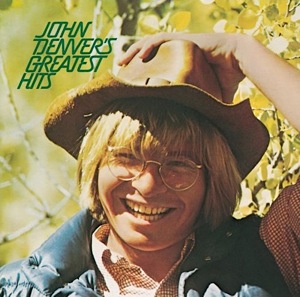
John Denver's Greatest Hits is American singer-songwriter John Denver's first compilation album, released in late 1973 for the holiday shopping season. A version known as The Best of John Denver with the same track listing was released in some countries.

"My Coo Ca Choo" is the first successful release for Alvin Stardust, reaching number two in the UK Singles Chart in December 1973. The glam rock single fared even better in Australia, where it spent seven weeks at the top and was the best charting single in the country in 1974.
"My Little Angel" is a song written by ex-Easybeats members Harry Vanda and George Young in 1974 and was recorded by Johnny Cabe, aka stage act William Shakespeare. It was Shakespeare's second big hit in Australia and his first number one, making the number-one spot in Australia for three weeks in early 1975.
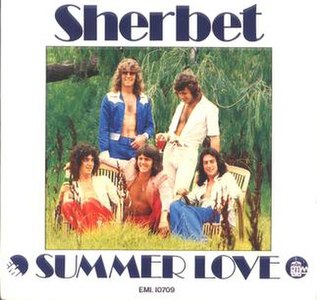
"Summer Love" is a song by Australian pop group, Sherbet and was released in March 1975. It became their first number-one hit on the Australian Kent Music Report Singles Chart. The song was promoted on the newly aired ABC TV pop series, Countdown, which gave it wide exposure. From early 1975 the group made more appearances on the show than any other band in the programme's history. In October, at the King of Pop Awards, "Summer Love" won the Most Popular Australian Single, the band won Most Popular Australian Group and their lead singer, Daryl Braithwaite, won the King of Pop award.
"A Song of Joy" is the title of a popular rock song by the Spanish singer and actor Miguel Ríos. It is set to the tune the Ninth Symphony by Ludwig van Beethoven, as arranged by Waldo de los Ríos, who specialized in arranging classical music to contemporary rhythms. The same melody is used in the well-known Christian hymn, "Joyful, Joyful We Adore Thee."

"Gimme Dat Ding" is a 1970 popular UK song, of the novelty type, sung by "one-hit wonder" The Pipkins, and written and composed by Albert Hammond and Mike Hazlewood. Released as a single, it is the title selection of an album which The Pipkins recorded and released on the EMI Columbia Records label. It also appeared on a compilation album of the same name, which The Pipkins shared with another up-and-coming UK group, The Sweet. It has also been included on many other compilation albums. "Gimme Dat Ding" was arranged by Big Jim Sullivan.

"Hot Line" is a song recorded by American family group the Sylvers, from their 1976 album Something Special. It was written by Freddie Perren and Kenneth St. Lewis. It became an international Top 10 hit, and is a gold record.
Ronnie McDowell is an American country music artist. His discography consists of 23 studio albums and 51 singles. Of his 51 singles, 34 charted on the U.S. Billboard Hot Country Songs charts between 1977 and 1990. McDowell also has two songs that cracked the Hot 100, most notably 1977's "The King Is Gone."
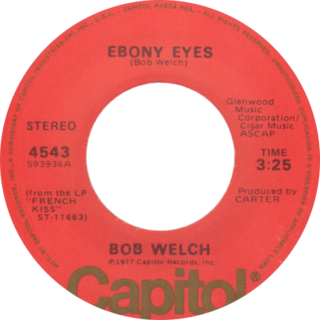
"Ebony Eyes" is a song written and performed by Bob Welch. The song was the second single release and second hit song from his album French Kiss. Backing vocals are provided by Juice Newton.
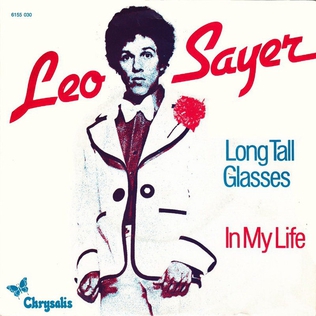
"Long Tall Glasses " is a 1974 song by Leo Sayer, co-written with David Courtney. It was released in the United Kingdom in late 1974, becoming Sayer's third hit record on both the British and Irish singles charts and reaching number four in both nations. It was included on Sayer's album Just a Boy.
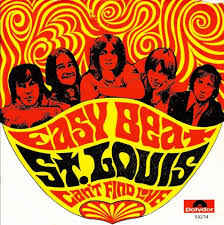
"St. Louis" is a song by Australian rock group the Easybeats, which was released in June 1969. It was co-written by its members Harry Vanda and George Young and recorded as their first single after signing to Polydor Records.
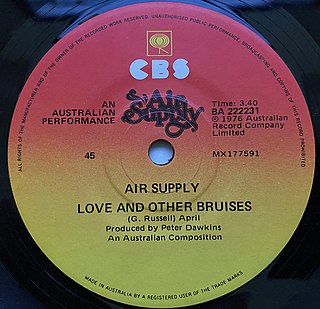
"Love and Other Bruises" is the debut single by English/Australian soft rock duo Air Supply, from their 1976 self-titled debut album. The song was a top ten hit in Australia, where it peaked at No. 6. The song also appeared on the duo's third album of the same name, which was their first release in the United States.

"Uptown Festival" is the debut single by the band Shalamar, released on Soul Train Records in 1977. The song is a medley of ten Motown classics sung over a 1970s disco beat. The radio edit, "Uptown Festival ", became a hit peaking at No. 25 on the Billboard Hot 100, No. 10 on the R&B chart and No. 2 on the Dance chart. It also charted internationally. After the success of the single, Dick Griffey, the booking agent for Soul Train, formed a vocal group, resulting in the first incarnation of Shalamar with Jody Watley, Jeffrey Daniels and Gary Mumford.















